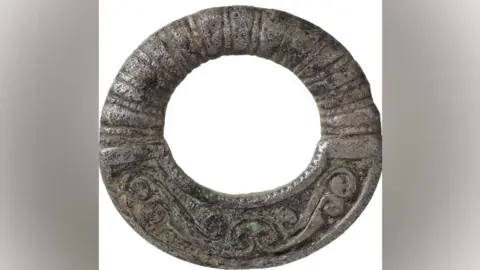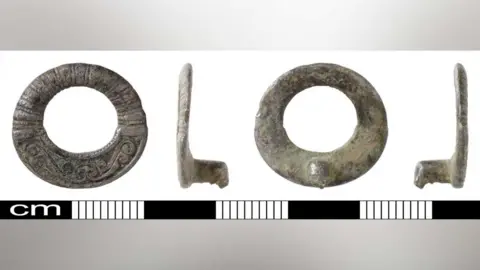East Walton silver pin find sheds light on end of Roman rule
 Norfolk County Council
Norfolk County CouncilThe discovery of a late Roman-era pin sheds light on a time when "certainties that held for centuries were beginning to shake up", a historian said.
The silver pin was found by a metal detectorist, near East Walton, Norfolk.
It is definitely late 4th or early 5th Century, despite having Iron Age-style designs, Dr Helen Geake said.
"As Roman Britain is collapsing, other influences are coming in and people aren't sure what's going to be the next big thing," she said.
"We know that Norfolk is going to become one of the heartlands of Anglo-Saxon culture, but late Roman-era people didn't know that," the Norfolk finds liaison officer added.
 Norfolk County Council
Norfolk County CouncilThe Roman state withdrew from Britain from the early 5th Century and within 40 to 60 years, England looked very different from the previous century and began to experience migration from northern Europe.
Dr Geake said: "There would have been quite a lot of turmoil and all the past certainties that held for centuries were beginning to shake up.
"And now Roman Britain is collapsing, other influences are coming in."
She described the ring-shaped pin, measuring 17.6mm by 18.9mm (0.69in by 0.74in), as "unutterably perfect with all those swirly designs seen in reproductions of Celtic jewellery in a space so tiny you can't possibly see it".
Such Iron Age designs had remained in existence during the centuries of Roman domination, but mostly beyond Hadrian's Wall.

What is treasure?
- Under the Treasure Act 1996, finders of potential treasure in England, Wales and Northern Ireland are legally obliged to notify their local coroner
- An inquest then determines whether the finds constitute treasure
- The act contains a number of definitions of "treasure", including prehistoric objects, coins that contain gold or silver and are at least 300 years old, or more recent valuable objects that have been deliberately hidden
- If the find is declared treasure, the finder must offer it for sale to a museum at a price set by the British Museum's Treasure Valuation Committee
- A reward is then offered to the finders and other relevant parties

Other examples of "proto-handpins" have been found elsewhere in England, but this is the first to be discovered in Norfolk.
Dr Geake said: "This shows how the Romans were no longer able to control their borders, so people from the fringes of the empire were popping up in places we didn't expect.
"It offers a little picture of how uncertain life was at that point."
The pin has been declared treasure and will join Norwich Castle Museum's collections.

Find BBC News: East of England on Facebook, Instagram and Twitter. If you have a story suggestion email [email protected]
